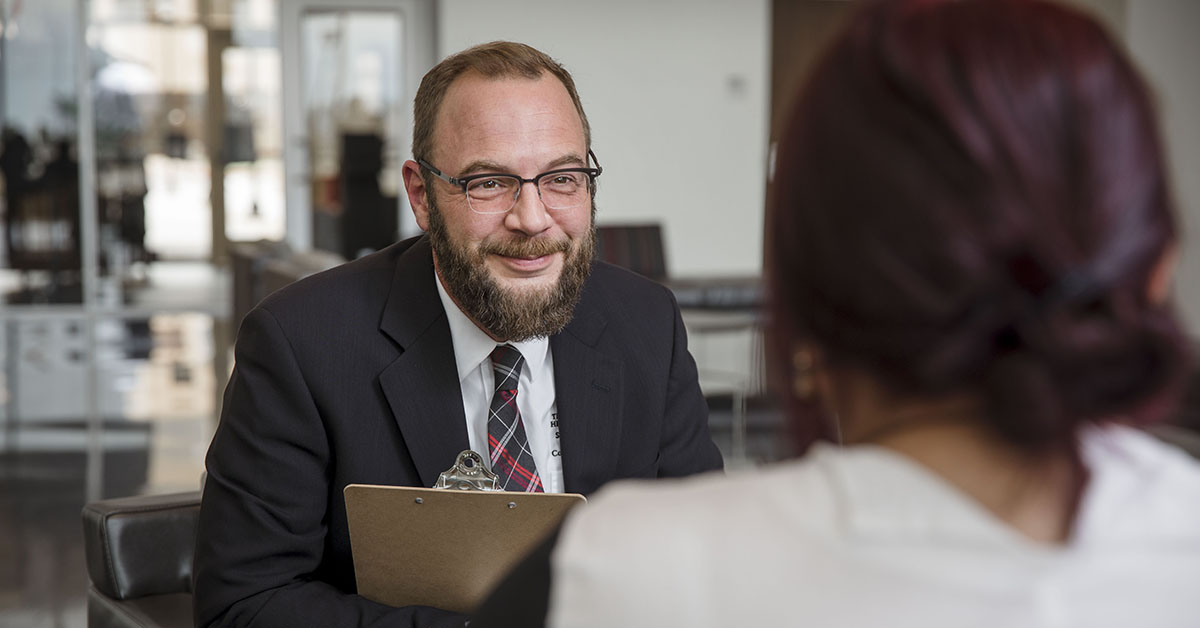TTUHSC Expert Explains Addiction and Ways to Keep Social Distancing from Effecting Recovery

For people in recovery from addictions, enforced isolation can be particularly difficult.
"One of the things that contributes to relapse is being isolated, being cut off from people," says Zach Sneed, Ph.D., Director of the Master of Science in Addiction Counseling (MASC) program at Texas Tech University Health Sciences Center (TTUHSC). "Another factor that we know plays a role is stress and anxiety.”
Of course, this precise combination of circumstances is what individuals all across the United States are facing in today's COVID-19 pandemic.
While communities are learning to navigate the new, strange structure of isolation and social distancing, many individuals are attempting to balance that with recovery from addiction. Addiction, Sneed describes, is a brain disease that results from repeated and escalated exposure to a substance or a series of behaviors.
“One of the things that we know about people who are in recovery is that they've had an addiction, and they've gone through some treatment process—or maybe some self-help—and they're working on a recovery plan,” says Sneed, pointing out that recovery plans can range from a couple of weeks to a long-term plan where people have been doing it for decades. “And that's one of the big things that's really supportive for people who are struggling with addiction, struggling with recovery or doing great with recovery—being connected to other people.”
With the novel isolation that COVID-19 requires, Sneed says that people who are going through recovery might find themselves struggling to find the human interaction they need in order to continue progressing. This in turn induces anxiety.
“Anxiety is something that can drive people to drink more, or use more, or smoke more or experience a relapse,” says Sneed.
As most people’s usual routines have been altered or interrupted, it leaves a lot of time at home—and for some, a lot of time alone.
“That also contributes to people having an opportunity to escalate use: not having a lot of peers to watch them, or peers to know what's going on,” says Sneed. “So they're not getting good, accurate social feedback.”
However, Sneed assures those going through recovery that there are options—even in these strange times.
“Right now is a very good time to step into what we call telehealth or telemedicine,” says Sneed. “It's a way to make contact with a health care provider without having to leave your home and go sit in an office.”
There are a variety of telehealth providers and a wide range of counseling and telemedicine office visits that are available online. Sneed recommends checking your insurance provider to see if one is preferred or covered and then looking at reviews of different service providers online to find the right fit.
Additionally, Sneed points out another option for finding connection in isolation: online communities.
“I would venture there’s probably a couple dozen different ones that are large and expansive and have a national presence,” Sneed says. “Each one has something that makes it kind of special and unique.”
Sneed explains that the variety of options allows for individuals to try out different communities until they feel comfortable.
Not only for those in recovery, but for everyone who feels unstructured by the new, extended time at home, Sneed acknowledges that frustration can lead to behaviors that, while comforting, might not be beneficial to our well-being.
“Sometimes we get frustrated and we get anxious, and we might revert to things that make us comfortable—and for some people that could be drinking, for others it might be going online to Amazon, or some other website, and shopping,” Sneed says. “It's important to pay attention to how much time we're putting into those activities and whether or not they're contributing to us meeting our goals throughout that day.”
In order to prevent relapse—and for anyone who occasionally reverts to bad habits—Sneed says it’s important to stay mindful about your actions and think about structuring your time according to what is healthiest for you.
“We're just going about our activities differently. So it's important that we pay attention to what we're doing,” says Sneed. “Also, if something is causing stress or anxiety or frustration, let's figure out what it is and if there's a way to change that without resorting to one of those activities that's not supportive to our health, and doesn't help us reach our goals.”
To craft a better structure for the day, Sneed recommends individuals write down their habits and how many times they act upon those behaviors. He also recommends limiting time spent with unproductive tasks such as watching TV or scrolling through social media.
“Take some time for yourself—time out from it. So that way it gives you the opportunity to focus your energy on things that you need to be productive with.”
Another important element of recovery, Sneed points out, is communicating with friends and family. In fact, Sneed encourages calling a friend or family member just to make contact and check in.
“People don't like to be disconnected from each other, but it's especially disruptive whenever you're in recovery because we've made connections such a strong part of the identity process,” says Sneed. “So I would recommend people pick up that phone. Call. Just reach out to check in with people. It doesn't have to be a really long conversation, but staying connected matters.”
While connection during isolation might be an obstacle, Sneed says that it is an opportunity to focus on recovery because it is beneficial to our overall health.
“One of the things that we have to pay particular attention to during this current time is that alcohol, substance use and tobacco use all decrease the ability of the immune system and makes it harder to fight illness,” says Sneed. “And that's exactly what we're trying to do is fight this illness and prevent its spread.”
